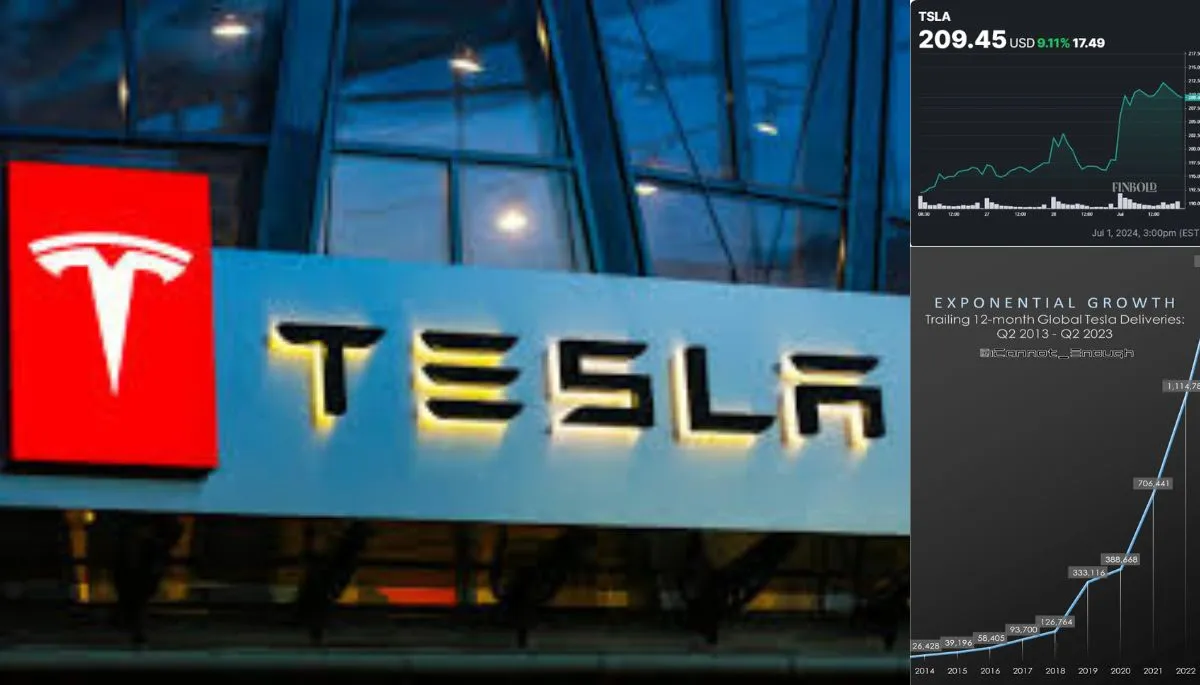Tesla Shares Growth Better-than-Expected
In the second quarter of 2024, Tesla delivered 443,956 vehicles, surpassing analysts’ expectations. Although this represented a 4.8% decline compared to the same period last year, it was 14.8% higher than the first quarter of 2024. As a result, Tesla’s stock rose more than 8% in early trading following the positive deliveries report.
Tesla’s growth can be attributed to several key factors:
- Vehicle Deliveries: Tesla consistently delivers a significant number of electric vehicles (EVs) globally. Strong demand for their Model 3 and Model Y has contributed to their growth.
- Battery Technology: Tesla’s advancements in battery technology have been crucial. Their Gigafactories produce batteries at scale, reducing costs and improving efficiency.
- Autonomous Driving: Tesla’s Autopilot and Full Self-Driving (FSD) features attract customers. The promise of future autonomous capabilities drives interest and sales.
- Global Expansion: Tesla has expanded its presence in various markets, including China and Europe. Local production facilities help reduce costs and improve delivery times.
- Energy Business: Beyond EVs, Tesla’s energy products (like solar panels and Powerwalls) contribute to revenue diversification.
- Brand and Innovation: Tesla’s brand perception, innovative designs, and Elon Musk’s influence play a significant role in attracting customers and investors.
How does Tesla Compare With Others
Tesla has been the dominant force in the electric vehicle (EV) market, but its market share has gradually eroded as more automakers introduce EVs.
- General Motors (GM): In Q1 2023, GM sold over 20,000 EVs, primarily consisting of Bolt EV and Bolt EUV models. Cadillac’s Lyriq SUV also made an impact, while the GMC Hummer EV faced production issues.
- Ford: The Mustang Mach-E has gained traction, and Ford is actively expanding its EV lineup.
- Other Players: Brands like Porsche, Mercedes-Benz, Lucid, and Genesis are entering the market, but their Q1 sales data isn’t universally available yet.
Tesla’s production Facilities
Tesla, Inc. operates several production facilities worldwide. Here are some ones:
- Tesla Fremont Factory (Fremont, California, USA):
- Products: Model S, Model X, Model 3, and Model Y electric vehicles.
- Formerly the GM Fremont Assembly and Toyota/GM NUMMI plant.
- Gigafactory Nevada (Storey County, Nevada, USA):
- Produces: Lithium-ion batteries, electric motors, Powerwall, and Tesla Semi components.
- Annual battery capacity of up to 35 GWh.
- Gigafactory New York (Buffalo, New York, USA):
- Manufactures: Solar Roof tiles and components for Supercharger stations.
- Also produces Powerpack batteries.
- Gigafactory Shanghai (Shanghai, China):
- Produces: Model 3 and Model Y electric vehicles.
- Annual production capacity of around 20,000 vehicles.
- Giga Texas (Austin, Texas, USA):
- Under construction.
- Expected to produce Cybertruck, Model Y, and other future Tesla vehicles.
Quality Control of Tesla in its Production Facilities
Tesla is actively working to improve its quality control measures by implementing automated systems.
- Automated Inspection Systems: Tesla is using automated robots to address ongoing quality issues. They have listed job positions for “Quality Inspection Engineers” who contribute to purpose-built automated inspection systems.
- Fremont Factory: Tesla is installing an “Automatic Inspection System” at its Fremont facility in California. This system will monitor build quality in vehicle interiors and inspect fascia quality using two new robots.
- In-House Battery Production: By manufacturing batteries in-house at Gigafactories, Tesla maintains better control over quality assurance and streamlines production processes.
Read also: The New Porsche 911 Facelift 2024: A Hybrid Performance Icon
Read More News: Click Here



